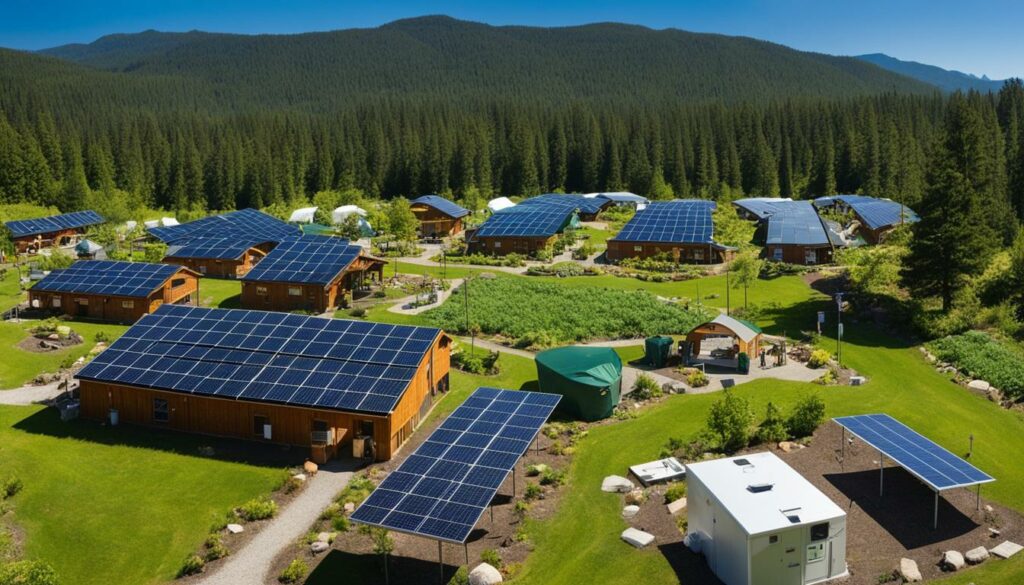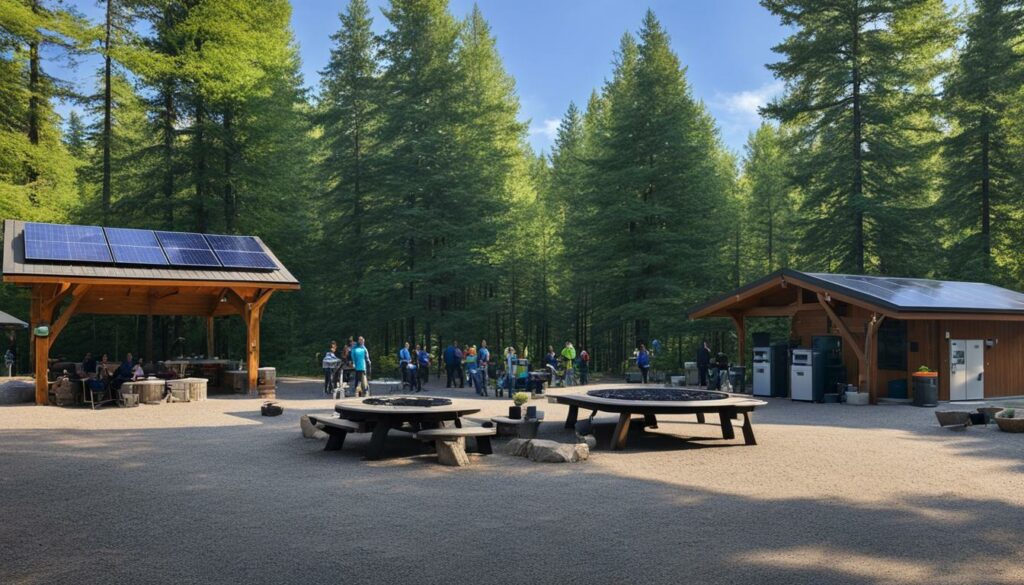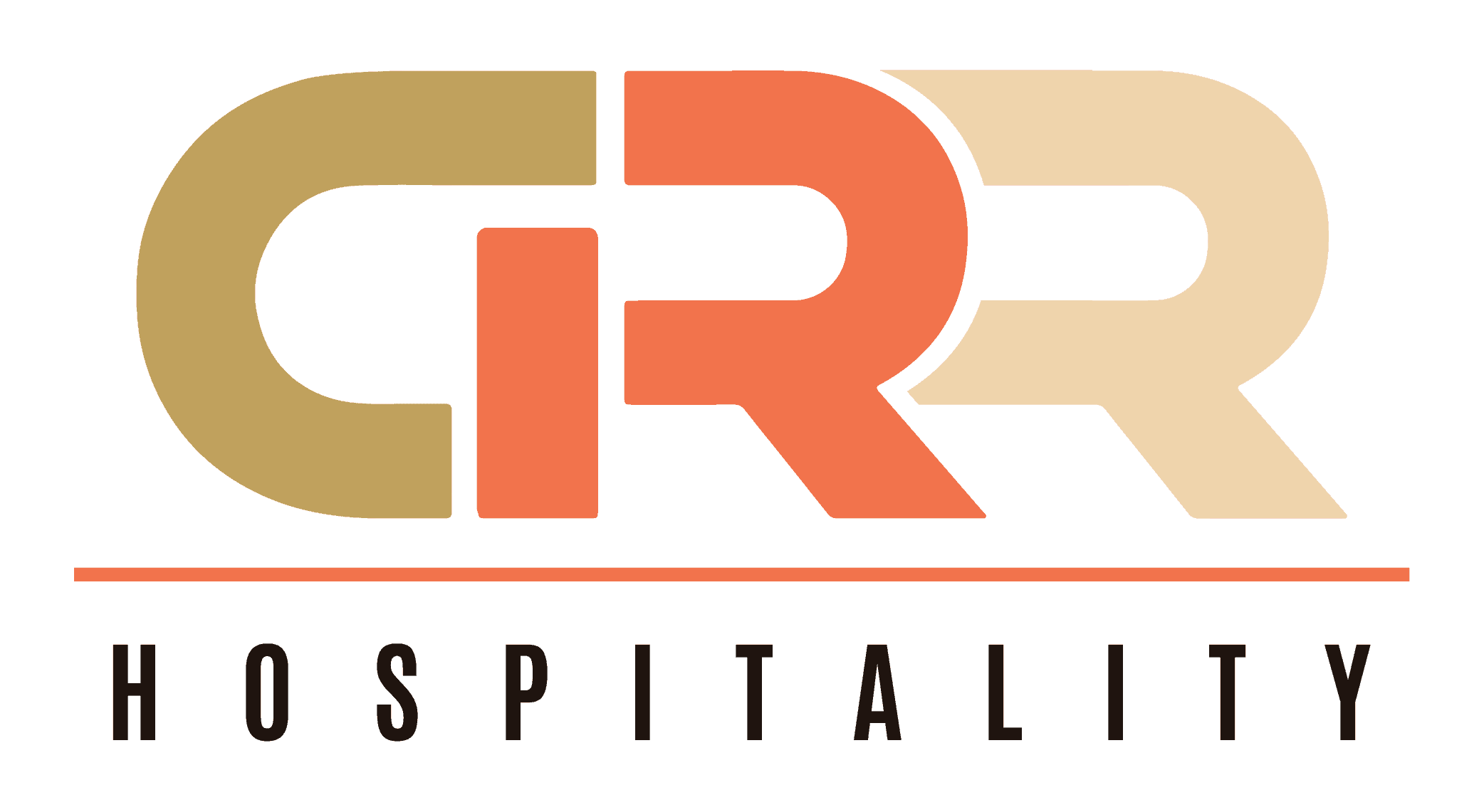Campgrounds are a popular vacation destination for families and outdoor enthusiasts alike, but running one can be an expensive undertaking. Between managing staff, maintaining facilities, and marketing to potential guests, the costs can quickly add up. In this article, we’ll explore various strategies for cost reduction in campgrounds so that owners can optimize their budget and improve profitability.
Key Takeaways:
- Reduce expenses by analyzing current expenditures
- Implement energy-efficient measures to lower overhead costs
- Streamline operations to minimize expenses
- Negotiate favorable vendor contracts to achieve cost savings
- Partner with local tourism organizations for cost-effective marketing solutions
Analyzing Current Expenses

To reduce expenses in campgrounds, analyzing current expenses is crucial. Identifying areas where costs can be reduced can help campground owners implement cost-effective solutions, resulting in significant savings.
A cost analysis table is a helpful tool to organize expenses and track expenditures. It helps identify areas that require cost reduction and provides necessary insights into current expenses. By using this table, campground owners can analyze expenses and identify cost-saving opportunities.
| Expense | Monthly Cost ($) |
|---|---|
| Electricity | 2000 |
| Water | 1200 |
| Staff salaries | 8000 |
| Supplies | 2000 |
Expense categorization is another effective way to analyze expenses. By categorizing expenses, campground owners can identify areas with the highest expenses and opportunities for cost reduction. Common expense categories for campgrounds include maintenance, salaries, supplies, overhead costs, marketing, and advertising.
By analyzing expenses, campground owners can identify cost-effective solutions that suit their budget and achieve significant savings.
Energy Efficiency Measures

Campgrounds can implement several budget-friendly strategies to reduce overhead costs. One of the most effective ways is by optimizing energy usage. Energy bills can comprise a significant portion of the operational costs, but by following these practical tips, campground owners can significantly cut down on electricity expenses:
Switch to LED Lighting
LED lights consume less energy and last longer than traditional lighting fixtures. By swapping out old bulbs, campground owners can reduce energy expenses and avoid frequent maintenance costs.
Install Programmable Thermostats
Programmable thermostats allow campground owners to set temperatures based on occupancy. This way, energy is not wasted on heating or cooling of vacant spaces, leading to significant cost savings in the long run.
Implement Energy-Saving Technologies
Implementing energy-saving technologies such as motion-triggered lights, energy-efficient HVAC systems, and solar panels can reduce energy consumption and expenses significantly. These initiatives not only help reduce overhead costs but also contribute to a sustainable environment.
Incorporating energy-efficient measures in campgrounds can result in significant savings in the long run. It is essential to perform regular audits to ensure that the systems are functioning optimally.
Streamlining Operations

Campground owners can significantly reduce costs by streamlining their operations. The following cost reduction techniques for campgrounds can help achieve this purpose:
Optimizing Staff Scheduling
Improving staff scheduling can help campground owners reduce labor costs and avoid paying overtime. By analyzing the daily tasks and deciding on the required workforce, owners can set schedules that ensure their campground runs smoothly whilst minimizing expense.
Efficient Inventory Management Systems
Implementing efficient inventory management systems can help reduce waste and control costs while remaining within budget. Owners can use software to automatically track inventory levels, receive alerts when stock is low, and ensure timely ordering and delivery to avoid delays. This reduces the chance of overstock and surplus inventory, which may not be used efficiently and could lead to avoidable financial wastes.
Leveraging Technology to Automate Processes
Automating mundane tasks through technology helps campground owners save time and cut costs. By adopting automation tools such as billing software, email marketing software, and maintenance scheduling software, owners can reduce the frequency of staffing and redirect these funds to other essential activities. Moreover, streamlining operations through technology helps to identify areas that require improvement in relation to time and cost-efficiency.
Campground expense management is a critical aspect of operations that cannot be overlooked. Streamlining operations through optimizing staff scheduling, implementing efficient inventory management systems, and leveraging technology to automate processes stands out as cost-effective strategies that can improve the financial health of a campground.
Negotiating Supplier Contracts

One of the most effective ways to cut costs in campground operations is by negotiating favorable contracts with suppliers. This not only enables campground owners to get the best prices on the products and services they need but can also lead to better payment terms and long-term cost savings.
When negotiating supplier contracts, it is important to consider factors such as:
- Bulk Purchasing: Purchasing products or services in bulk can lead to substantial discounts and cost savings over time. Campground owners should consider their needs and potential usage to determine whether bulk purchasing makes economic sense for them.
- Payment Terms: Longer payment terms can help campground owners to maintain their cash flow and avoid late payment fees. However, they should also be aware that longer payment terms may result in higher overall costs due to financing expenses.
- Price Comparisons: Comparing prices from multiple suppliers can help campground owners find the best deal. However, they should also ensure that they are evaluating suppliers based on quality, reliability, and reputation, not just price.
Campground owners should be prepared to negotiate each aspect of their supplier contracts, including price, payment terms, delivery schedules, and product warranties or guarantees. By being proactive and assertive in negotiations, they can often secure better deals and reduce their operating costs significantly.
Example:
Campground X has negotiated a contract with a local food supplier that provides a 10% discount for bulk purchases. By ordering in larger quantities and taking advantage of this discount, they are able to reduce their annual food costs by over $5,000. In addition, they negotiated an additional 30 days of payment terms, allowing them to better manage their cash flow and avoid late payment fees.
Marketing and Advertising Strategies
To increase visibility and attract more visitors to their campgrounds, owners can use cost-effective marketing and advertising strategies that align with their budget.
Targeted Marketing Campaigns
Owners can target specific customer segments by identifying their unique needs and preferences. This can be achieved by conducting market research and analyzing customer feedback. Once the target audience is identified, owners can create personalized marketing campaigns that cater to their interests. Such campaigns may include email marketing, social media advertising or direct mail marketing.
Leveraging Social Media Platforms
Social media platforms provide an excellent platform for campground owners to promote their business. By maintaining an active presence on social media, owners can build a community of followers and promote their business to a wider audience. Social media platforms also offer cost-effective advertising options that enable owners to target specific audience segments based on their interests and demographics.
Partnering with Local Tourism Organizations
Another way to increase visibility is by partnering with local tourism organizations. This enables owners to benefit from the established networks of tourism organizations and generate additional business at a lower cost. Owners can also participate in local fairs and events hosted by these organizations to promote their business and connect with potential customers.
Tip: To maximize the effectiveness of marketing campaigns, owners should track their performance metrics such as visits, clicks, and conversions to assess their ROI and refine their strategy accordingly.
Outsourcing Non-Core Functions
To reduce costs, campground owners can consider outsourcing non-core functions. This strategy allows them to focus on their core business operations while still ensuring that essential tasks are carried out efficiently. By outsourcing tasks such as maintenance, landscaping, and accounting, campground owners can save on the cost of hiring full-time staff and avoid the expense of purchasing specialized equipment.
Outsourcing these functions can also help campground owners to benefit from the expertise of professionals in their respective fields. For instance, by hiring a landscaping company, campground owners can ensure that their grounds are well-maintained and visually appealing to visitors. By outsourcing accounting, payroll, and tax preparation tasks to a specialist accounting service, they can ensure that their financial records are accurately maintained and that they remain compliant with tax laws.
Outsourcing is a cost-effective solution for campgrounds looking to optimize their budget and improve profitability. However, it is essential to carefully evaluate potential providers and negotiate favorable terms to ensure that the cost savings are significant and sustainable over the long term.
Pros and Cons of Outsourcing Non-Core Functions
| Pros | Cons |
|---|---|
| Cost savings on overheads such as hiring, training, and equipment purchases | Potential loss of direct control over certain aspects of operations |
| Access to specialized expertise and technology | Risk of reduced quality or inconsistency in service delivery |
| Improved flexibility and scalability | Risk of data breaches or security breaches |
| Opportunity to focus on core business operations | Potential for communication issues with third-party providers |
Outsourcing non-core functions is a viable way for campground owners to manage costs while benefiting from specialized expertise and technology. As with any business decision, it is important to evaluate the pros and cons carefully and consider the potential impact on overall business operations before making a decision.
Implementing Sustainable Practices
Going green not only helps reduce the cost of running a campground but also aids in preserving the natural environment. Campgrounds can implement various sustainable practices that keep expenses at a minimum while making the land a better place for guests.
One of the most important ways to reduce expenses in campgrounds involves water conservation. The cost of water can quickly become overwhelming for a campground. Installing low-flow showerheads, faucets, and toilets can help reduce water usage and expenses. Furthermore, investing in water-efficient landscaping techniques, such as drip irrigation, can reduce costs significantly.
| Sustainable Practice | Benefits |
|---|---|
| Waste Reduction and Recycling Programs | Helps reduce the volume of waste produced by the campground and provides a source of revenue by selling recyclable materials. |
| Solar Energy Usage | Provides an alternative source of energy and allows campground owners to reduce energy costs over time. |
| Composting | Offers a simple way to turn waste into fertilizer for landscaping projects. It can also help reduce disposal costs. |
In addition, waste reduction and recycling programs can go a long way in reducing expenses. By reusing items and recycling waste, there is less need for disposal, thus reducing costs. Campgrounds can also consider generating their own electricity by using solar panels, which provide a sustainable and affordable energy alternative.
By implementing sustainable practices, campgrounds can significantly reduce expenses, boost their revenue, and play a critical role in preserving the environment.
Conclusion
In conclusion, implementing effective cost reduction strategies is vital for campground owners looking to optimize their operations and improve profitability. By analyzing current expenses, optimizing energy efficiency, streamlining operations, negotiating favorable supplier contracts, adopting sustainable practices, and outsourcing non-core functions, campground owners can significantly reduce their overhead costs and improve their bottom line. These cost-saving measures not only benefit the business but also contribute to the preservation of the natural environment.
It is crucial for campground owners to prioritize cost reduction and continually seek ways to improve their operations while maintaining the quality of service. By adopting the strategies outlined in this article, campground owners can reduce costs without compromising on quality and improve their competitiveness in the market.
Overall, effective cost management is key to the success of any organization, including campgrounds. By striving to reduce expenses, campground owners can create a sustainable business model, increase profitability, and provide valuable experiences for their guests.
Implementing these cost reduction strategies requires determination and effort, but the benefits are well worth it. By applying these approaches, campground owners can stay ahead of their competition, secure their financial future, and make a positive impact on the environment and their stakeholders.
By following these cost-reducing strategies, campground owners can keep their operations sustainable while still offering quality services to their guests.
FAQ
How can campground owners reduce their operational costs?
Campground owners can reduce operational costs by implementing various cost-saving measures such as analyzing current expenses, adopting energy efficiency measures, streamlining operations, negotiating supplier contracts, implementing cost-effective marketing strategies, outsourcing non-core functions, and implementing sustainable practices.
What are some cost reduction strategies for campgrounds?
Some cost reduction strategies for campgrounds include analyzing current expenses to identify areas for savings, optimizing energy usage through measures like LED lighting and programmable thermostats, streamlining operations through efficient inventory management systems, negotiating favorable supplier contracts, implementing targeted marketing campaigns, outsourcing non-core functions, and implementing sustainable practices.
Why is it important for campground owners to analyze current expenses?
Analyzing current expenses allows campground owners to identify areas where costs can be reduced. By understanding their current expenditure, they can determine which expenses are necessary and find cost-effective solutions to optimize their budget and improve profitability.
What are some energy efficiency measures that campground owners can adopt?
Campground owners can adopt energy efficiency measures such as using LED lighting, installing programmable thermostats, implementing energy-saving technologies, optimizing water usage, and utilizing renewable energy sources. These measures help reduce overhead costs and minimize the environmental impact of the campground.
How can campground owners streamline their operations to reduce costs?
Campground owners can streamline operations by optimizing staff scheduling, implementing efficient inventory management systems, leveraging technology to automate processes, and improving communication channels. These measures help minimize unnecessary expenses and improve overall operational efficiency.
How can negotiating supplier contracts help in cutting costs?
Negotiating favorable supplier contracts allows campground owners to secure better pricing, discounts, bulk purchasing options, and extended payment terms. By getting the best deal from vendors, campground owners can reduce costs and improve the financial health of their business.
What are some budget-friendly marketing and advertising strategies for campgrounds?
Some budget-friendly marketing and advertising strategies for campgrounds include targeted marketing campaigns, leveraging social media platforms, partnering with local tourism organizations for promotion, and utilizing cost-effective online advertising options. By focusing on targeted marketing efforts, campground owners can maximize their marketing budget and attract more visitors at a lower cost.
How can outsourcing non-core functions help reduce costs for campgrounds?
Outsourcing non-core functions such as maintenance, landscaping, and accounting allows campground owners to focus on their core business operations while benefiting from cost savings. By leveraging the expertise of external professionals, campground owners can reduce staffing expenses and improve operational efficiency.
What are some sustainable practices that campground owners can implement to reduce expenses?
Campground owners can implement sustainable practices such as water conservation measures, waste reduction programs, recycling initiatives, and the use of eco-friendly materials. These practices not only contribute to cost reduction but also promote environmental stewardship and align with the preferences of eco-conscious travelers.
What is the importance of cost reduction in campgrounds?
Cost reduction is essential for campgrounds as it directly impacts profitability. By implementing various cost-saving measures, campground owners can optimize their operations, reduce overhead costs, and improve financial performance. This, in turn, allows them to offer competitive pricing, enhance guest experiences, and invest in campground enhancements for long-term success.





